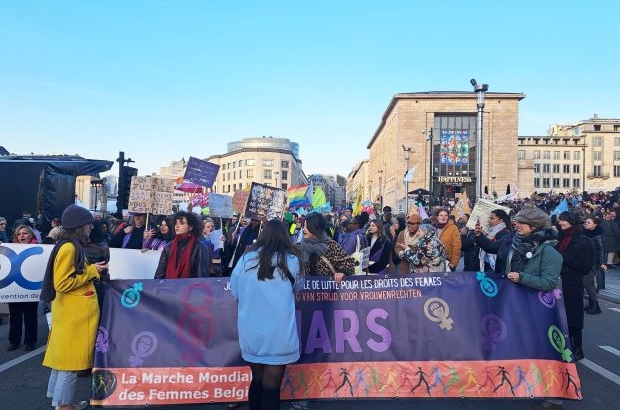- Daily & Weekly newsletters
- Buy & download The Bulletin
- Comment on our articles
Some 15,000 people joined march for women’s rights in Brussels on 8 March, say organisers
Some 15,000 people took to the streets of Brussels on Friday to voice their demand for women’s rights and gender minorities, according to the Collecti.e.f 8 March, reports RTBF.
Crowds gathered at Place de l’Albertine before heading towards Place Poelart and Place Royale before returning to their starting point. Messages on placards borne by demonstrators included, “Equality will not kill your masculinity” and “Police, justice, taking no further action: you are complicit”.
The march was organised by international feminist and anti-capitalist action movement "World March of Women". One of its key aims was to highlight the negative impact of austerity policies on the living conditions of women, "limiting their autonomy and keeping them in insecurity," according to the movement.
“We are marching because even today in Belgium gender discrimination exists,” said coordinator, Marcela De La Peña. Whether the wage gap or sexist and sexual violence (occurring in the street, at work, or at home), she pointed out the need for "more structural initiatives to raise awareness of this discrimination among the different actors of society".
Abortion rights were also among protesters' grievances. “We are marching for the elimination of the obstacles that prevent access to safe and legal abortions in our country, in particular through the extension of the legal period for accessing an abortion or the elimination of the obligatory reflection period of six days,” said Amnesty International Belgium.
The unequal distribution of “care” work, professionally and privately, was highlighted by Collecti.e.f 8 March. Women spend around seven hours more than men doing domestic work, whether shopping, cleaning the home, picking up children, argued the collective.
“This ‘care’ work, which ultimately has nothing natural about it, is invisible, unpaid and suffers from a cruel lack of recognition,” insisted spokesperson Malika Roelants. "A feminist strike thus allows us to show that when women stop working, producing and caring, the world stops, because we are essential to the proper functioning of society."
The collective also wanted to show its support for Palestinian women, and more broadly for victims of armed conflicts during which women's bodies are used as "spoils of war".
Photo: ©Belga/Timon Ramboer



















